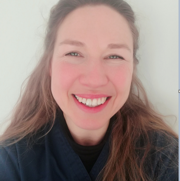My journey as an art therapist began in Sheffield, where I completed my professional training in the year 2000.

Tiffany Arnold - Art Therapist
I have always wanted to move to North Wales, and I was so excited when I was offered a job working in the community CAMHS (Child and Adolescent Mental Health Services) team in Bangor. That was in 2001 and involved setting up an art therapy service from scratch. I also worked part time for the NSPCC based in a secondary school, and later on in an NHS adult medium secure forensic unit.
In community CAMHS I learned to do generic assessments and was lucky to get training and experience in different therapeutic models, like Dialectical Behaviour Therapy (DBT), Brief Therapy, Solution Focussed Therapy, and Children’s Accelerated Trauma Therapy (CATT).
I transferred to the North Wales Adolescent Service (NWAS) in 2012, which is a CAMHS inpatient unit serving the whole of North Wales. It was a steep learning curve, but I’ve really enjoyed the opportunity to develop my work through Mentalization Based Therapy training and specialist clinical supervision. It has been a real privilege to get to know the young people and hear their individual stories.
There is another aspect to my work, and I realise that I’ve always been involved in project co-ordination and get easily distracted by side projects! I love meeting people, chatting, having new ideas, and working across disciplines.
I’m interested in the way that art therapists’ clinical skills can be applied at service level to work with change management. This fits with my passion about helping people get their voice heard.
I was so lucky at NWAS that they let me lead a three-year service improvement project based on co-production. It was an amazing opportunity. It felt so refreshing to be able to support people who might otherwise not have had a voice to influence real change within our huge, flagship service.
The project was based on what sometimes feels (within the NHS) like a rather novel idea - really listening to people and then actually just doing what they tell us feels useful.
I see so many areas where art therapists can make a real difference by applying their skills in different areas.

